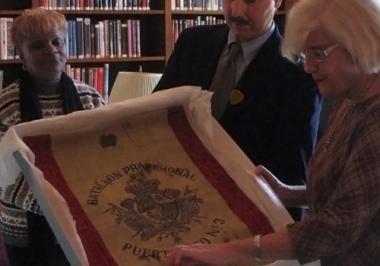Not long ago, two Puerto Rican friends and I met in front of Easthampton City Hall and unexpectedly ran into a piece of our history.
Bolted onto the outside wall is an iron plaque that commemorates American veterans of the 1898 Spanish-American War. That plaque is a link to the war that was responsible for getting Puerto Ricans here.
That "splendid little war," as then-Secretary of State John Hay termed the four-month conflict—a war spurred on by media magnate William Randolph Hearst to increase newspaper circulation—is also commemorated in downtown Greenfield by the statue of an Anglo man carrying a rifle.
Nowhere are the names of the Puerto Ricans who were killed in the war nor the years following the brutal new order on the island. Their names, if they are remembered by anyone at all, have been passed down quietly through generations of family members only.
In Puerto Rico's public education system, American history is a requirement; Puerto Rican history is an elective. This is one way victors rewrite history.
This we do know: Gen. Nelson Miles, born in Massachusetts and notorious for slaughtering indigenous people across the western U.S., led U.S. troops into Puerto Rico to take it after a withering Spanish empire lost the war.
And here we are. Today, 4 million Puerto Ricans form the Puerto Rican diaspora throughout the U.S.
More than 100 years after the war, we have been gaining footholds in every field, from the arts to politics. In elective offices in this region, Jose Tosado is a popular Springfield city councilor. Diosdado Lopez is a Holyoke city councilor who coordinates an annual cultural event in his city. State Rep. Cheryl Coakley-Rivera, D-Springfield, is another highly regarded leader.
Luis Gutierrez, a U.S. Congressman from Illinois, was the point man in Puerto Rico for President-elect Barack Obama, the candidate who wrote a detailed list of promises to the island should he win the presidency. Hartford's mayor, Eddie Perez, is part of the change that is slowly spreading to Western Massachusetts, where Puerto Ricans are no longer relegated to rehashed West Side Story stereotypes.
In the attic of the Westfield Athenaeum Library, a flag from Puerto Rican "Provisional Battalion Number 3," which fought on the side of Spain in the Spanish American War and may have fought against Miles, was found recently and then returned to Puerto Rico in a ceremony moving in its simplicity. It was yet another example of our survival.
For the Puerto Ricans at the ceremony, the flag's discovery here, where we live now, and its return to Puerto Rico, where it flew in that war between colonizers, made real the connections between our colonization and our diaspora, between our beginning and our continuation.
When the library's executive director, Christopher Lindquist, presented the flag to Josefina Gomez, interim librarian of the General Library of the Institute of Puerto Rican Culture, it wasn't just fabric that was returned to the island. The Westfield Athenaeum Library honored everyone, equally.
Gomez was delighted. It is the first flag Puerto Rico has received from the Spanish-American War, she told me. In fact, it is the first flag from the Spanish-American War anywhere in Puerto Rico. "This flag is a witness to a very important event, a watershed event, in our history. It is thrilling to have it come home," she said.
Up close, the flag causes an unsettling sensation. Bloodstains appear to mark it, and no cliches about military duty and heroism can blot the horrible ravages of war nor the despotic colonization that followed it.
In that continuing colonization, my grandmother, Ines Maria Mendoza, was fired from her job as a teacher in the 1930s because she was against teaching in English on an island where everyone spoke Spanish except U.S.-appointed governors.
She told me once that Puerto Ricans endure. Not 400 years of misery under the oppressive colonial rule by Spain, not constant assaults on the island from the English, French and Danish armadas, nor ultimately, the United States, can bury us.
What was once solely a symbol of war now represents a shared future where all voices are to be heard. And just this year a high school in San Juan was named after my grandmother. We are writing our history at last."
Natalia Munoz is editor of La Prensa of Western Massachusetts (www.LaPrensaMa.com).



